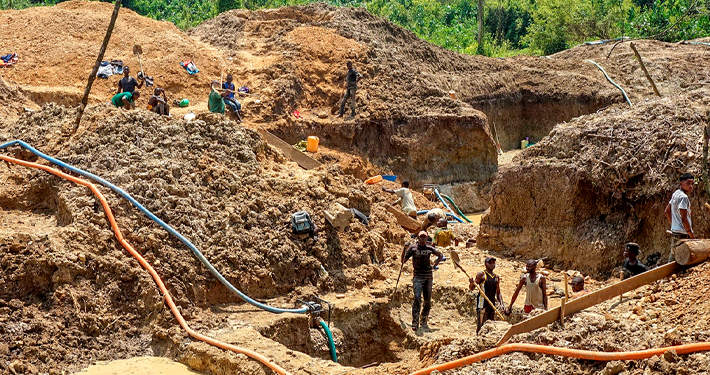The growing global demand for gold and critical minerals is driving a surge in crime, corruption, and instability; particularly across Africa’s mineral supply chains. A new report by the United Nations Office on Drugs and Crime (UNODC), released Tuesday, paints a troubling picture of how the rising value of gold is attracting organized crime syndicates, corporations, and individuals into illegal mining and cross-border trafficking.
Titled Minerals Crime: Illegal Gold Mining, the report reveals how criminal networks are embedding themselves in gold supply chains, using the metal’s portability and high value as a tool for money laundering. These actors exploit regulatory loopholes, bribe public officials, and manipulate documentation to launder illicitly mined gold into formal markets. Tactics range from declaring illegal gold as recycled to forging export permits and misreporting the country of origin.
In Africa, the report warns, gold has become a powerful resource for criminal groups who use proceeds to finance armed conflict, destabilize governments, and deepen violence. Artisanal and small-scale mining (ASM), which involved nearly 10 million people across Sub-Saharan Africa as of 2019, is frequently co-opted by transnational crime networks—especially in fragile regions like the Sahel.
The UNODC highlights widespread abuses in the gold trade, including sexual exploitation, forced labor, displacement of communities, and environmental destruction. It also stresses the need for harmonized legislation, stronger enforcement, and better data collection to disrupt these illicit activities.
In some African countries, artisanal miners are forced to sell gold far below market value under pressure from criminal groups, while traffickers smuggle the gold abroad to sell it at inflated prices. Between 2014 and 2016, gold was trafficked into Togo from neighboring countries, with buyers paying above-market rates to circumvent currency restrictions—thereby distorting economies and enabling financial crimes.
These challenges are not unique to Africa. In Latin America, drug cartels have turned to illegal gold mining to expand revenue streams, while parts of Asia with weak regulation and high demand are also seeing surges in smuggling and environmental degradation.
The environmental cost is also severe. Illegal mining often involves hazardous chemicals like mercury, causes unchecked deforestation, and leads to improper waste disposal—all contributing to biodiversity loss and serious public health risks.
In Nigeria, illegal mining continues to wreak havoc on the economy and security. In response, the Nasarawa State House of Assembly recently passed a law to regulate mining activities and impose stiff penalties on offenders. Under the new legislation, corporate offenders will face fines of N10 million or up to five years in prison. Individuals and group members involved in illegal mining are subject to a N5 million fine or two to five years of imprisonment.
UNODC’s Angela Me emphasized the need for urgent international coordination. “Due diligence and traceability of critical minerals are essential,” she said, calling for targeted law enforcement and standardized legislation to secure supply chains and protect communities.
As global demand for critical minerals continues to rise; driven in part by the energy transition, the consequences of unchecked illegal mining are becoming more dire. Without urgent reforms, Africa’s mineral wealth risks becoming a source of instability rather than development.










